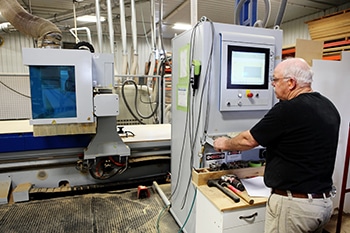CNC (Computer Numerical Control) Operator or Programmer
CNC Programming Offers a Viable Option within the Manufacturing Jobs Sector
 There can be little argument that high-tech advancements, particularly those relative to computer technology, have influenced today’s methods of production and by association transformed many types of manufacturing jobs. As an example, where manufacturers once relied on the manual operation of lathes to machine tools or component parts, they now profit from the incorporation of computer numerical control or CNC machinery; use of this technology can produce larger volumes of parts/components with more efficiency, better uniformity, and higher tolerances, thus saving manufacturers time and money.
There can be little argument that high-tech advancements, particularly those relative to computer technology, have influenced today’s methods of production and by association transformed many types of manufacturing jobs. As an example, where manufacturers once relied on the manual operation of lathes to machine tools or component parts, they now profit from the incorporation of computer numerical control or CNC machinery; use of this technology can produce larger volumes of parts/components with more efficiency, better uniformity, and higher tolerances, thus saving manufacturers time and money.
With many companies either integrating CNC machinery or expanding their use of such equipment in their production facilities and processes, it has generated new employment opportunities in the manufacturing sector. These jobs include the role of CNC machine operator or CNC machinist. Individuals in such positions are responsible for creating the computer numerical control or CNC programming needed to produce any machine tools and to drive the production of the actual components/parts; this is achieved through the application of sophisticated computer-aided design (CAD) software.
The minimum educational requirement for a CNC machine operator or CNC machinist is a high school diploma, although the completion of an associate degree program at either a community college or technical institution is highly recommended. Courses of study at the post-secondary level should include an emphasis on the following:
- Blueprint reading
- Computer systems
- Reading/writing code
- Basic math and geometry
- Computer-aided design (CAD)
- CNC programming courses (basic/advanced)
In addition, candidates may be required to complete a CNC programming apprenticeship in order to attain full certification. This might be offered as part of their associate degree program or incorporated in the training processes of an employer; successful completion of an apprenticeship usually consists of 2,000 hours on the job, or the equivalent of one year of experience, plus achieving the minimum passing grade on a written exam.
In terms of their specific job responsibilities, a CNC machine operator/machinist may be tasked with some/many of the following:
- Set-up, programming, and operation of various CNC machinery
- Performing tests to verify adherence to production specifications
- Adjusting or reprogramming computer numeric controls as needed
- Observance of safety procedures according to regulations/standards
- Ensuring that all preventative maintenance requirements are performed
- Troubleshooting computer-related issues that may be hindering production
- Completion of appropriate production and quality assurance documentation
- Maintaining current knowledge and skills through participation in CNC training
Due to a growing need for CNC skills in general, employment prospects for CNC machine operators/programmers can be pursued throughout the manufacturing sector in Canada.

Connecting Top Talent
With Great Companies
Find your ideal position today
Use Recruitment Agency Resources to Find CNC Programming Apprenticeships
 A CNC machine operator apprenticeship can be an important step in attaining the skills and experience needed to enter and succeed in this field. However, these opportunities might not be readily identifiable by interested candidates, as they might not be posted or advertised in print or online forums. In many instances, employers will hire a recruiting agency to find suitable apprentices for CNC programmer training on their behalf.
A CNC machine operator apprenticeship can be an important step in attaining the skills and experience needed to enter and succeed in this field. However, these opportunities might not be readily identifiable by interested candidates, as they might not be posted or advertised in print or online forums. In many instances, employers will hire a recruiting agency to find suitable apprentices for CNC programmer training on their behalf.
One such agency is Winters Technical Staffing, a leader in the recognition and placement of qualified candidates in manufacturing jobs within Toronto and its surrounding area for over 40 years. The recruiting specialists at Winters Technical Staffing have established a strong network of manufacturing industry contacts and as a result, will often have access to apprenticeship opportunities that may not be common or general knowledge.
Consequently, those seeking a career as a CNC machine operator/programmer may find benefit in aligning their search efforts with the resources and experience of the recruiting professionals from Winters Technical Staffing.
For more information on pursuing a CNC programming a
Contact Winters Today
Launch your career as a CNC machine operator/programmer through the networking and resources available from one of Toronto’s leading manufacturing staffing agencies. Call the job placement specialists at Winters Technical Staffing today at 416-495-7422 to book a no-obligation discussion with one of our experienced consultants.


